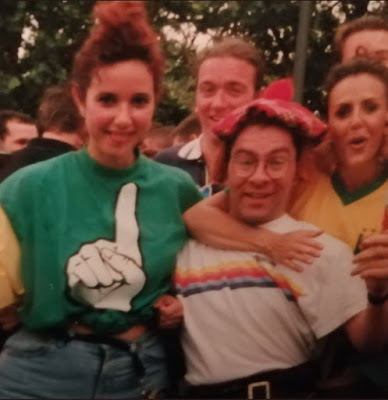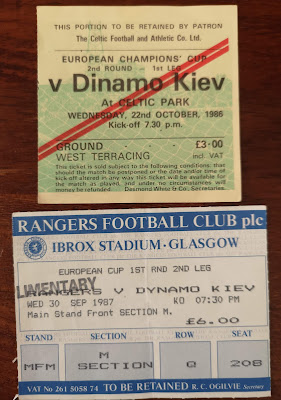Scotland v Ukraine
After being postponed due to the Russian invasion of Ukraine and the ongoing conflict, on Wednesday 1st June 2022 the Ukrainian national football team will come to Glasgow to play their football World Cup qualifying match against Scotland.
Although it is trite to say it, there are some things more important than sport. The brutal war in Ukraine is resulting in the daily deaths of many soldiers and civilians, and the demolition of cities. Despite that background Ukraine are keen to get this football match played. While the Russian football team is now banned from international competition, this match and the subsequent World Cup allow Ukraine to stand on the world stage. Just as they did at the Eurovision Song Contest, Ukraine will have great public support from around the world, while Scotland's best chance of World Cup qualification for decades is in danger of turning us into Sam Ryder, the underdog who has to smile while feigning pleasure in coming second.
Sport has always been political and it is impossible pretend that it happens in some sterile bubble. Whether your players are taking the knee, wearing a poppy on their shirt or displaying an expression of national identity by playing at all. Football teams stand by their flag, wear national colours and symbols, respect their national anthem (even if opposition fans don't always). The fact Scotland still plays as a national football team despite not being an independent nation for over 400 years is a statement of how we see ourselves. In the Euro 2020 competition the Ukrainian team wore a strip that featured an outline of Ukraine, but an outline that contained Crimea, which was annexed by Russia in 2014, and Donbas and Luhansk where Russian backed separatists had been fighting at that time. "Glory to Ukraine" was printed along the back if the collar, though UEFA banned "Glory to the Heroes". Benign enough statements to an outsider but complicated by their meaning in the first nationalist movements in Ukraine in the 1917-21 war with Communist Russia, and their later adoption by various Ukrainian groups.
The prize for the winners on Wednesday night is a further play-off against Wales, and then qualification to the World Cup in Qatar. In the most obvious way this World Cup allows FIFA to accept large quantities of money from an oil rich state, and Qatar to sanitise its image in front of a global audience. The shiny infrastructure will be on display, but stories of the deaths of possibly thousands of migrant workers will continue to be suppressed. Money talks. If you can afford to pay the thousands of pounds you can go online now and buy your quarter final package through national carrier Qatar Airways, all bundled up with 4 nights hotel accommodation and your flights. This doesn't feel like the carnival of football that previous World Cups have been.
 |
| Scotland v Brazil, France 98 |
Recent Form
The Ukrainian nation came into being with the collapse of the USSR in 1991. The national football team played their first international matches in 1992, losing their first ever game 3-1 to Hungary.
Since then they have been two steps ahead of Scotland as far as qualifying for major tournaments. They qualified for the 2006 World Cup in Germany, getting as far as the quarter-finals before being eliminated in a 3-0 defeat to Italy.
As co-hosts (with Poland) of Euro 2012 they qualified automatically for that competition, but failed to progress from a group that contained England, France and Sweden. Their final game in the competition was at the Donbass Arena, in Donetsk, where Wayne Rooney scored the only goal of the game for England.
Ukraine qualified for Euro 2016 in France via a play-off, but lost all three of their games at the finals, against Poland, Germany and Northern Ireland.
Scotland made their first appearance at a major tournament at Euro 2020 for a generation. Whilst Scotland only picked up one point from their three games and were eliminated, Ukraine got to the quarter-finals again, knocking out Sweden on the way, before eventual tournament losers England, beat them 4-0 in Rome.
Previous Scotland v Ukraine Matches
Scotland and Ukraine have met twice before in competitive matches, when they were drawn in the same qualifying group for Euro 2008. In a group that also contained Georgia, Lithuania and (of course) the Faroe Islands it was France and Italy that qualified.
The first match between Scotland and Ukraine was played at the home of Dynamo Kyiv in October 2006. While Ukraine were managed by legendary player Oleg Blokhin, Walter Smith was in charge of Scotland. With Andriy Shevchenko and Andrij Voronin leading the line for Ukraine there was much to make Scotland nervous. Oleksander Kucher scored his first goal for Ukraine on the hour, before Shevchenko finished off the tie with a penalty in the 90th minute after Steven Pressley received a red card for bringing him down in the box. 2-0 to Ukraine.
In 2015 Oleksander Kucher would receive the quickest red card in Champions League history, being hooked for fouling Thomas Muller in the box when Shakhtar Donesk took on Bayern Munich, a game which Bayern won 7-0.
The Scotland team that was defeated that day is noteworthy for the amount of middling future football managers that were playing that day: Graham Alexander (currently managing Motherwell), Robbie Neilson (Hearts), Steven Pressley, David Weir, Gary Caldwell, Barry Ferguson, Paul Hartley (Cove Rangers). Only James McFadden, Kenny Miller and Craig Gordon from the starting eleven haven't yet decided they've got what it takes for management, although to be fair Craig Gordon is still playing.
 |
| Oleg Blokhin |
Although the three points dropped in Ukraine would later cost them qualification, the Scotland team at that time were playing with great confidence, and James McFadden's goal had earned a famous victory over France in Paris before the return fixture in Scotland against Ukraine. Scotland arrived at Hampden having won five games in a row, desperate to make it six. I attended that match at Hampden in October 2007. Alex McLeish was in charge by then, and within 10 minutes Scotland were 2-0 up with goals from Kenny Miller and Lee McCulloch. Shevchenko poked one in before half time to make it 2-1 to Scotland, but James McFadden wrapped up the three points to make it 3-1 to Scotland in the second half.
Dinamo Kiev
 |
| Tickets for Celtic and Rangers games against Dinamo Kiev |
Before Ukraine was an independent country, their representatives on the footballing world stage were Dinamo Kiev (now written as Dynamo Kyiv). Everyone when they are growing up adopts a few foreign teams to keep an eye on, and for me it was Dynamo Kyiv. I have always been a Partick Thistle fan, so when Dynamo Kyiv were drawn against Celtic in 1986 and Rangers in 1987 I had to go along and support my team.
In the 1970s and 1980s the Dynamo Kyiv team was the backbone of the Soviet national football team. When Scotland played USSR in the World Cup in Spain in 1982 they had five Dynamo Kyiv players in the starting line up, while Scotland had only one Partick Thistle player. The Dynamo Kyiv team that played Celtic in 1986 had nine of the USSR World Cup squad from Mexico 86 playing. The USSR team that lost the Euro 1988 final to The Netherlands, and to that Marco Van Basten's goal started with seven Dynamo Kyiv players on the pitch.
When they played Celtic in the 2nd round of the European Cup in 1986, Dynamo Kyiv were the reigning UEFA Cup Winner's Cup champions. The first leg was played at Celtic Park. The biggest incident of the first half was the tackle from Zavarov that broke the ankle of Tommy Burns and meant he was out of action for 6 months. Dynamo Kyiv were the better team, but their first half goal was cancelled out by a Maurice Johnston equaliser in the second half. A nervous Celtic team sought assurances from the SFA that it was safe to travel to Kyiv, only six months after the nearby Chernobyl disaster. On the pitch they suffered a 3-1 defeat, and made their exit from the tournament.
A year later and Rangers were now the Scottish Champions, under the leadership of player-manager Graeme Souness. Drawn against Dynamo Kyiv in the first round of the European Cup they lost the away leg 1-0 to a goal by a certain Oleksiy Mykhaylychenko. Like his team mate. Oleg Kuznetsov, he would soon enough be earning a wage at the Ibrox team. The Kyiv squad also included Sergiy Baltacha, Igor Belatov, Oleg Blokhin, Vasyl Rats. I had got a complementary ticket for this game as my parents were friends with the man who was working as the Russian interpreter for Rangers, after having performed the same role for Celtic the year before. My hopes of seeing Rangers swept aside were soon crushed when the Kyiv keeper throw a ball out against the backside of one of his defenders, allowing Mark Falco to tap in. Ally McCoist scored the winning goal of the tie in the second half to take Rangers through. they got as far as the quarter finals where Steaua Bucharest ended their run.
World Cup Qualifier, June 2022
So on Wednesday night Scotland and Ukraine battle it out at Hampden Stadium in Glasgow for the right to get beaten by Wales next Sunday.
The Ukrainian family that fled the war and now live next door to me in Glasgow have got tickets to the game for their two children and I hope they have a lovely night. However, while the rest of the world wishes Ukraine well, I will be there to cheer Scotland on to victory. I have absolutely no idea how this game is going to go, or how able the Ukrainian players are managing to focus on it. While the Eurovision Song Contest was won for Ukraine by a public vote, it is only right and proper that the Scotland players face the Ukrainian squad as a team we need to defeat, and try their upmost to do that. I am absolutely certain that is what the Ukrainian players hope to see, and they have every chance of beating us without our help.
May the best team win, and I am sure wee Leon and Misha next door will allow me to hope that it is Scotland.

